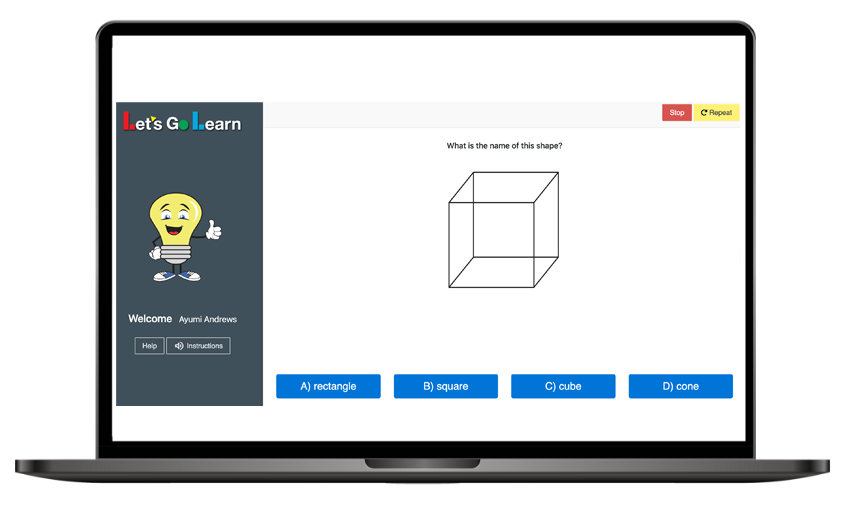Press

Let’s Go Learn Unveils AI Assistant for Special Education at CEC 2025 in Baltimore
Baltimore, MD – March 14, 2025 – Let’s Go Learn, a leader in precision diagnostic assessments, has officially launched the beta version of its groundbreaking AI Assistant at the Council for Exceptional Children (CEC) 2025 Conference in Baltimore, where the company proudly served as a Platinum Sponsor. This revolutionary tool is set to transform the way Individualized Education Program (IEP) documentation is created, reducing the administrative burden on special education teachers and empowering them to focus on what matters most—teaching and improving student outcomes.
Leveraging the precision diagnostic data from Let’s Go Learn’s ADAM (Adaptive Diagnostic Assessment of Mathematics) and DORA (Diagnostic Online Reading Assessment), the AI Assistant instantly generates a first-draft Present Levels of Academic Achievement and Functional Performance (PLAAFP), streamlining one of the most time-intensive aspects of IEP development.
“This is a game-changer for special education,” said Richard Capone, CEO/Co-Founder at Let’s Go Learn. “By automating PLAAFP generation, we’re giving educators back the time they need to work directly with students, while also ensuring consistency and accuracy in IEP documentation.”
Customizable for District-Specific Requirements
In addition to its core capabilities, Let’s Go Learn’s AI Assistant will be able to be pre-trained using each district’s specific PLAAFP formats, SMART goals, impact statements, and other IEP documentation requirements. This means that special education teams can seamlessly integrate the AI Assistant into their workflows while maintaining compliance with state and district regulations.
A Secure & Privacy-First Solution
Understanding the critical importance of student data privacy, Let’s Go Learn has built its AI Assistant with strict security protocols. All data is sent anonymously, ensuring that no identifiable student, teacher, or school information is shared with the AI. Additionally, all conversations and generated documentation are securely stored on Let’s Go Learn’s platform for teacher and administrator review, ensuring full transparency and control.
Empowering Educators, Enhancing Student Success
The AI Assistant is not just a tool—it’s a paradigm shift in how special education professionals navigate the complexities of IEP development. By automating tedious documentation tasks, Let’s Go Learn is ensuring that teachers have more time to focus on instruction, interventions, and fostering student success.
The AI Assistant will be available for early adopters in May, with full district-level customization options rolling out by July 1st.
For more information or to schedule a demo, visit www.letsgolearn.com.
About Let’s Go Learn, Inc.
Let’s Go Learn is a personalized learning software company focused primarily on MTSS, special education, and intervention programming to support K-12 students. Over 20 years ago, Let’s Go Learn pioneered online, computer-adapted diagnostic assessments to determine the learning needs of each student. In contrast to limited screening tools, Let’s Go Learn’s platform quickly determines student deficits, needs, and causal relationships to help develop individualized learning paths for each student. Millions of students worldwide have benefitted from Let’s Go Learn’s assessment data, pin-pointed instruction, and robust progress monitoring. The platform is designed to monitor progress from interventions in specific areas, while building detailed reporting and data to support the development and tracking of IEP content and goals.
Media Contact: Richard Capone, 510-455-2098.

Recent blog posts…
Teacher Retention and Well-being
Top 3 Key Takeaways: Enhancing teacher well-being directly impacts retention and student success. Comprehensive professional development and supportive leadership significantly improve teacher satisfaction. Community building and fair recognition practices are essential for maintaining
Juneteenth 2025
Top 3 Key Points: Historical Importance: Juneteenth marks June 19, 1865, the date when enslaved African Americans in Texas were finally informed of their freedom, highlighting a delayed justice and a critical turning
Poverty In School
Key Takeaways: Poverty’s pervasive impact on education: Children from low-income families face higher absenteeism, lower standardized test scores, and reduced graduation rates at every educational stage, from kindergarten readiness through college enrollment. Early
Poverty Impacts Educational Outcomes
Poverty Impacts Educational Outcomes Poverty profoundly impacts educational outcomes, particularly in critical foundational areas like math and reading. Understanding the relationship between socioeconomic status and academic performance helps educators, policymakers, and communities effectively






